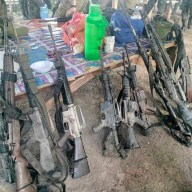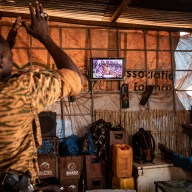MIAN JUY, Afghanistan – Taliban recruiters have begun showing up over the last few weeks in the tiny villages that dot the desert landscape, heralding the start of the fighting season in this war-weary part of the world.
The militants are looking for fresh volunteers or conscripts in what has become an annual ritual – one that Canadian troops are trying to thwart by their presence, and with common-sense arguments.
Now that the poppy harvest is largely complete and the Taliban are flush with cash to assemble their mercenary army, they’re turning their guns and bombs on international troops in southern and eastern Afghanistan.
In the last two days, NATO forces have suffered at least three combat deaths with an equal number of injuries as insurgents step up their attacks and roadside bombings. None of the casualties so far this week have involved Canadian troops.
The western alliance’s principal base in the region, Kandahar Airfield, was hit three out of four nights recently with wildly erratic 107-mm rockets. There have been short, brutal firefights between militants and NATO troops in the northern parts of Kandahar province.
Last week, the war took a particularly brutal turn with the Taliban’s use of a child to deliver a suicide bomb that injured two Canadian soldiers and killed an Afghan trooper.
Capt. Jeffrey Tebo has been to meetings, or shuras, with community elders where dozens of young, fighting-age males are standing at the back room sizing him up carefully.
One thought runs through the young platoon commander’s mind: “I don’t want to see them at the other end of a gun and I don’t want them to be someone we’re fighting.”
Tebo, decked out in full body armour and helmet with a LAV III fighting vehicle behind him, knows any direct fight with the lightly armed, sandal-wearing militants is going to end badly for them.
His appeal becomes more direct.
“There’s no reason for this to happen guys; please let’s find a better way,” says Tebo, 27, who leads 7 Platoon in Charlie Company, 2nd Battalion, Princess Patricia’s Canadian Light Infantry.
He says it’s tough to think some of these young men could be the enemy by next week.
“It’s one of the saddest things to think of when I’m looking here, talking to this nice village elder; we’re talking about education, their children, their future, how wonderful we’d all like it to be.”
The message is probably getting through to the old men because “they’ve lived through violence for a long time,” but he’s not certain the young guys entirely get it.
After poppy season there is traditionally a big job vacuum in this desperately poor region. A lot of young men don’t have a whole lot of things to do.
As he patrols the Arghandab and Sha Wali Kot districts, north of Kandahar, Tebo says he and other platoon commanders have put more emphasis on steering potential Taliban recruits toward highway construction jobs and other infrastructure projects funded by Canada and the international community.
He respectfully arm-twists the elders, peppering them questions: “So what are your plans? What kind of employment is lined up for all of your young males in the region?”
Sometimes he gets answers, other times he’s met with polite silence or the brushoff.
“We just try to get them involved and say: ‘Hey look, there’s a way to make some money, stay employed and support your family that doesn’t involve violence’,” said Tebo, who’s on his first tour of Afghanistan since joining the army five years ago.
Many of the soldiers serving under Tebo are new to Afghanistan. They are not quite sure what to expect now that the harvest is complete and the Taliban are gearing up for a surge in violence.
“We’ve heard horror stories from the last few tours, but I guess we’ll find what happens,” said Master Cpl. Jim Collins, 26, a reservist and LAV III gunner from Kamloops, B.C.
Cpl. Bryan Rowlandson, another reservist and member of 7 Platoon, said regardless of what’s ahead, their job and the threats remain the same.
“I’m not really apprehensive,” he said at the end of a two-hour long foot patrol in 55 degrees Celsius heat.
“That walk we just went on could have gone bad, whether it was now or two weeks from now. I don’t think it really matters.”
















